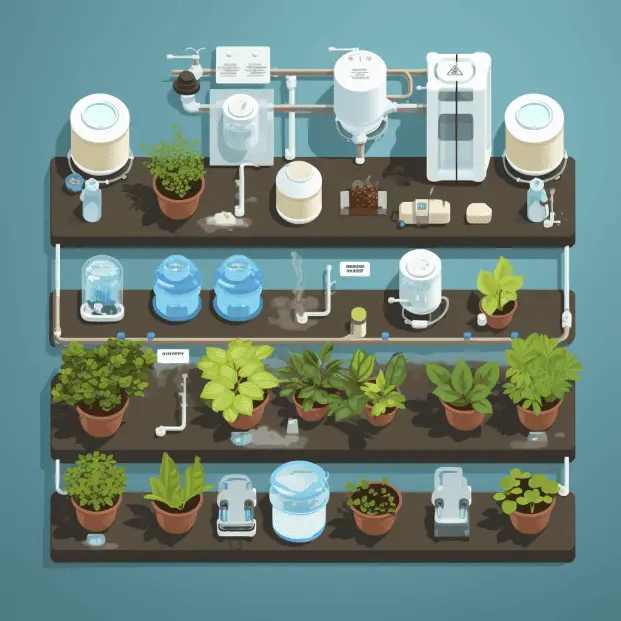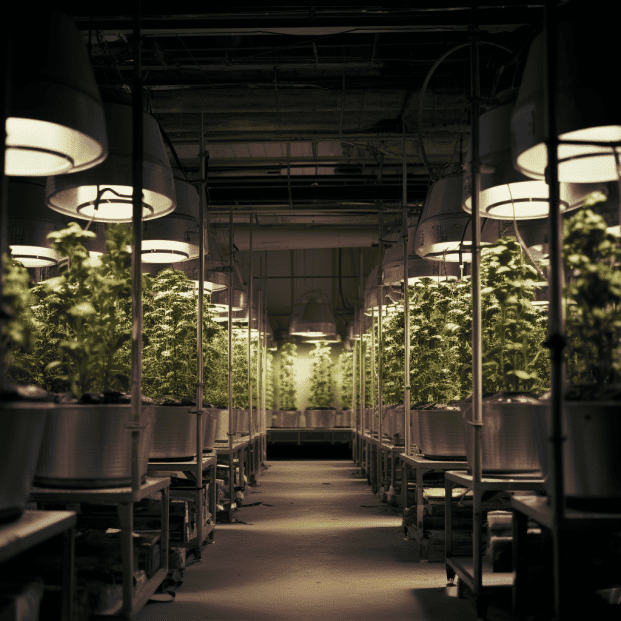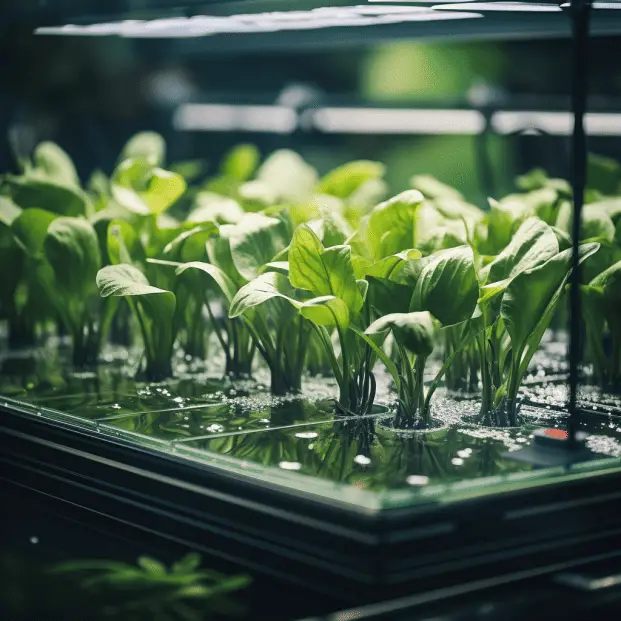Hydroponics water – the liquid foundation for healthy plants.
Yes, you can just add water and nutrients.
But not so fast!
The truth is, water quality drastically impacts your plants.
And most tap water needs treatment.
Grab some pH strips and a pencil, folks.
Class is in session!
By the end, you’ll be a hydroponics water expert.
But first, a pop quiz:
True or false – all water is created equal when it comes to plants?
Trick question! The answer is absolutely…false.
Water composition matters big time.
Now here’s the kicker:
Most tap water is simply not ideal for plants out the gate.
Yikes!
Don’t sweat it! With my help, you’ll learn to transform tap water into a flawless plant elixir.
From filtration methods to reverse osmosis, we’ve got you covered.
Get ready to give your plants the liquid love they deserve.
Teach tap water some new tricks with me as your guide!
Fair warning:
Keep reading or risk stunted, unhealthy plants.
The right hydroponics water solution is mandatory for thriving gardens.
We’ll explore the best options for purification, treatment, and composition.
Discover the secrets stalwart gardeners have known for years about proper water preparation.
Join me, your faithful gardening guru, on this essential journey into the heart of the very substance that sustains all plant life.
Let’s get growing!
KEY TAKEAWAY
What is the best water solution for hydroponics?
The best water solution for hydroponics is one that maintains ideal pH levels, is free from contaminants, and provides essential nutrients, ensuring optimal plant health and robust growth. (1)
Evaluating Hydroponics Water Sources: The Benefits and Drawbacks
When it comes to hydroponic systems, finding the right water source is key.
Water acts like a delivery truck, carrying important minerals and nutrients to the plant’s roots.
So we’ve got to make sure we choose a good driver!
One thing to think about is what’s already dissolved in the water.
Some plants need more of certain minerals, like calcium or magnesium, while others need less.
Testing water’s mineral content beforehand prevents any deficiencies or imbalances down the road, which can really stunt growth.
Another biggie is water quality.
Pure, contaminant-free water keeps plants happy and healthy.
Stuff like chlorine and heavy metals can be toxic to plants over time.
Using filtered or purified water avoids issues and gives plants the best growing conditions.
We can’t forget about environmental impact either.
Choosing sustainable sources like collected rainwater or recycled water reduces the carbon footprint.
The planet stays happier, and the plants get what they need.
It’s a win-win!
Achieving Ideal Water Quality: Key Parameters for Plant Health

Water quality has a huge effect on how well plants grow in a hydroponic system.
To make sure it’s just right, there are some key factors to keep an eye on. (2)
One is pH level.
Plants absorb nutrients best when water is slightly acidic, between 5.5 and 6.5.
If the pH drifts too high or low, it actually blocks nutrients from being taken in properly.
That throws everything out of whack and can really stunt growth.
Electrical conductivity (EC) is another one.
EC measures the total dissolved solids in the water, telling us how concentrated the nutrients are.
Keeping the EC in the right zone makes sure plants get nutrients in the ideal amounts.
Water temperature matters too.
The sweet spot is 68°F to 72°F.
This temperature range helps the roots stay healthy and take up nutrients efficiently.
It also prevents pathogens from taking over.
Regularly monitoring these parameters ensures the plants always have access to premium nutrient water.
Tap Water Treatment: Removing Harmful Contaminants

Tap water contains lots of contaminants that can harm hydroponic plants – chlorine, heavy metals, pesticides, and more.
These can hinder growth, cause deficiencies, even kill plants!
To avoid issues, it’s crucial to treat tap water before using it in a hydroponic system.
Carbon filtration effectively removes chlorine and chemicals.
Reverse osmosis is great for eliminating heavy metals.
Testing the water regularly with kits also helps spot any remaining contaminants.
With proper treatment, we can remove the dangerous contaminants from tap water and keep plants healthy.
Distilled vs. Reverse Osmosis vs. Filtered: Comparing the Options
There are a few popular methods of purifying water for hydroponics.
How do distilled, reverse osmosis, and filtered water compare?
Distilled water is boiled and condensed to remove impurities.
This gets rid of minerals, chemicals, and bacteria.
The high purity is great but may lack some beneficial minerals.
Reverse osmosis uses a membrane to filter out contaminants, leaving only pure water molecules.
It balances purity and minerals well but may need remineralization.
Filtered water goes through a physical filter to remove sediments and large particles.
It retains more minerals but requires high initial water quality.
The best choice depends on tap water quality, desired purity level, cost, and specific contaminant concerns.
Evaluating these factors helps select the ideal purification system for a hydroponic setup.
Picking the Perfect Water Purification System for Your Hydroponic Garden
When it comes to hydroponics, having high-quality water is absolutely essential for healthy, thriving plants.
The water delivers important nutrients and minerals right to the roots, so making sure it’s contaminant-free is crucial.
But with so many water purification options out there, how do you choose the right system?
First, we’ve gotta look at the water source.
Is it well water, tap water, rainwater collection? Knowing what’s already in there helps pick the best way to purify it.
Tap water contains stuff like chlorine and metals that can harm plants over time.
So filters that specifically remove those things are key.
Next, think about the size of your hydroponic operation.
A small setup might just need an under-sink filter.
But bigger systems growing acres of plants may need heavy-duty reverse osmosis.
Matching purification power to garden size prevents problems down the road.
And of course, cost comes into play.
While that ultra-fancy system would be nice, cheaper options like sediment filters or UV treatment might fit the budget better.
Prioritize must-have features, then look for affordability.
At the end of the day, the goal is giving our plants premium water to unlock their maximum potential.
Taking the time to pick the right purification system pays off with healthier, more bountiful harvests.
Our hydroponic gardens thrive when the water does too!
Keeping Conditions Just Right: Monitoring Water Quality
In hydroponics, monitoring water quality parameters like pH, EC, and temperature is critical for healthy plant growth.
As the vehicle delivering nutrients to the roots, water must be kept in optimal condition to ensure proper nutrient absorption.
pH is one of the most important factors, as plants can only uptake nutrients effectively within the 5.5-6.5 range.
When pH drifts outside this zone, it actually blocks the absorption of nutrients, leading to deficiencies and stunted development.
Regular pH testing and adjustment is essential.
Tracking electrical conductivity (EC) is also key.
EC measures the concentration of dissolved salts and indicates the overall nutrient levels in the water.
Keeping EC in the ideal range prevents nutrient excesses or shortages that disrupt growth.
Water temperature should be kept between 65-80°F for productive hydroponic cultivation.
Temperatures below or above this range will slow down metabolic processes and nutrient uptake.
Frequently changing out the water maintains steady nutrient levels over time and prevents the buildup of salts or toxins that can be harmful.
Testing and adjusting these parameters with meters creates optimal growing conditions.
Proper monitoring and maintenance of water quality provides plants with a perfectly balanced nutritional diet.
Just like people, plants thrive when their needs are consistently met – their health and vigor become maximized in an ideal hydroponic environment.
Optimizing Water Change Frequency
Determining the optimal schedule for changing out the water reservoir is important for hydroponics success.
The frequency required can vary based on several factors.
Larger hydroponic systems with greater water volumes or faster-growing plants often require more frequent water changes than smaller, slower-growing setups.
The rate of evaporation also plays a role – warmer conditions cause faster evaporation, necessitating more frequent additions of fresh water.
The best way to optimize frequency is through careful observation.
Signs like leaf discoloration or slow growth indicate it’s time for a change.
The water may also appear murky or develop a foul odor when nutrient levels get too far out of balance.
A good general guideline is to change the water every 1-2 weeks.
However, monitoring plant and water conditions should ultimately dictate frequency.
Finding the ideal schedule takes some trial and error.
The goal is to maintain consistent nutrient levels over time.
With the right water change frequency, plants get a steady supply of nutrients in balance.
This allows for healthy, rapid growth.
Fine-tuning the schedule is an important part of managing any hydroponic system.
Conclusion
Well, folks, we’ve made it to the end of our hydroponics water journey.
As we’ve delved into the world of water sources and purification systems, we’ve learned that keeping your plants hydrated is no easy task.
But fear not!
Armed with knowledge about tap water treatment options and the benefits of distilled, reverse osmosis, and filtered water, you can now make an informed decision for your hydroponic setup.
Just remember to monitor those pH levels and EC values like a pro and change that water when necessary.
Happy growing!
References
- https://www.yourindoorherbs.com/which-water-hydroponics/
- https://extension.psu.edu/a-water-quality-toolkit-for-greenhouse-and-nursery-production
Related Articles
- https://tophydroponicgarden.com/hydroponic-supplies-basics/
- https://tophydroponicgarden.com/what-type-of-water-to-use-for-hydroponics/
- https://tophydroponicgarden.com/can-you-use-filtered-tap-water-hydroponics/
Was this helpful?

Crystal Erickson is an agriculture enthusiast and writer with a passion for sustainable farming practices and community development. Growing up on a family farm in rural Iowa, Crystal developed a love for the land and a deep appreciation for the hard work and dedication required to make a farm successful.
After completing a degree in Agriculture and Environmental Science from Iowa State University, Crystal began her career as an agricultural journalist, covering stories and issues related to modern farming practices, crop management, and livestock production. She quickly established herself as a respected voice in the industry, known for her insightful reporting and thoughtful analysis.
Over the years, Crystal has written for a variety of publications, including Farm Journal, Successful Farming, and Modern Farmer, as well as contributing to several academic journals focused on sustainable agriculture and community development. Her work has been recognized with numerous awards, including the Iowa Farm Bureau’s Young Farmer Achievement Award and the National Association of Farm Broadcasting’s Farm Broadcaster of the Year.


